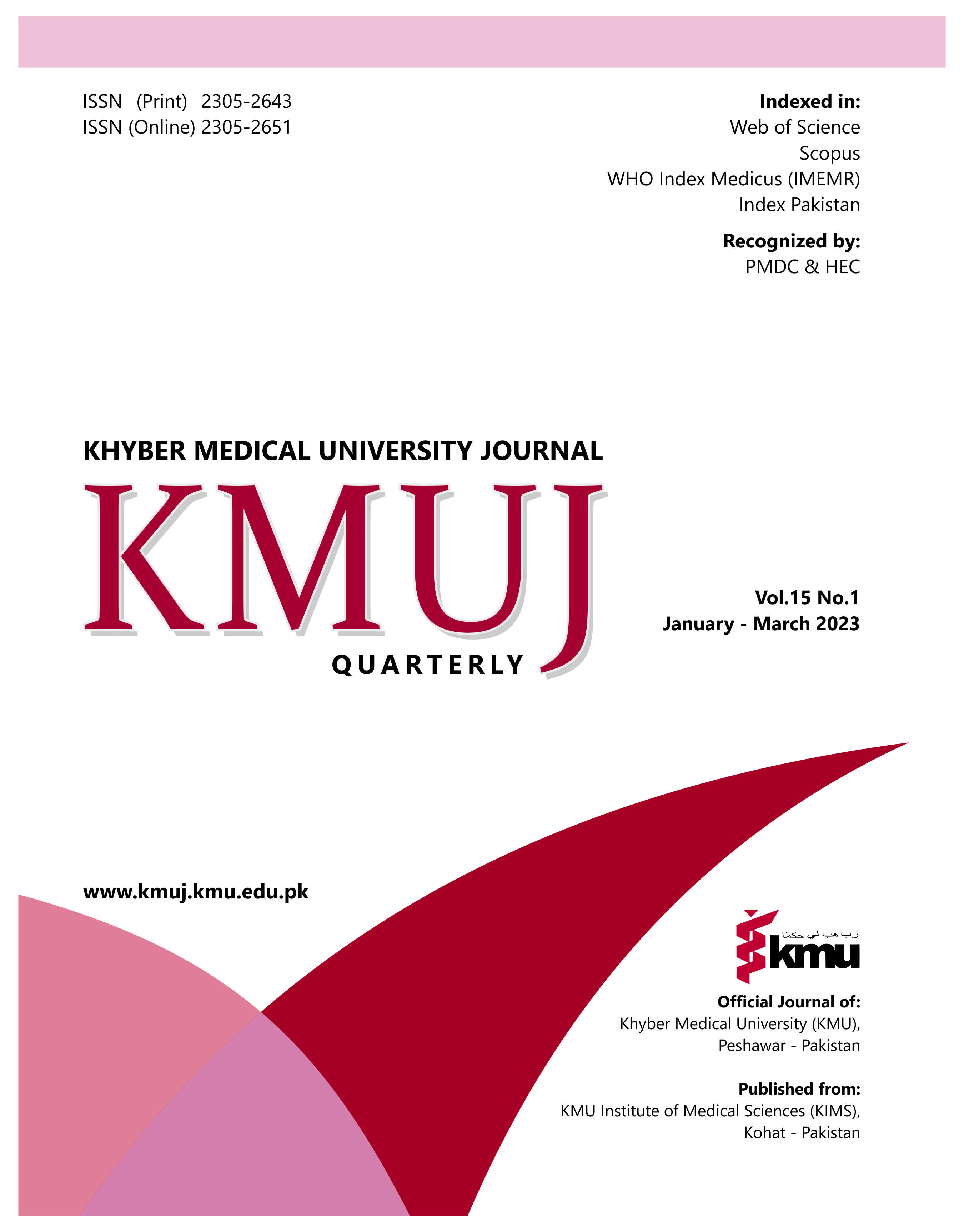VISUAL OUTCOME AND POST OPERATIVE COMPLICATIONS AFTER SILICONE OIL REMOVAL IN PSEUDOPHAKIC VITRECTOMIZED PATIENTS
Main Article Content
Abstract
OBJECTIVE: To assess visual outcome and post-operative complications after silicone oil removal in pseudophakic vitrectomized patients.
METHODS: This interventional case series study was conducted at Department of Ophthalmology, Medical Teaching Institution Lady Reading Hospital, Peshawar, Pakistan from February 2019 to January 2020. A total of 32 eyes of 32 patients were enrolled in the study after fulfilling inclusion and exclusion criteria using non-random consecutive sampling technique. All patients had pars plana vitrectomy with silicone oil done 6 months ago and were pseudophakic. Silicone oil removal was carried out in all patients and visual outcome and surgical complications assessed on 1st and 14th post-operative day. Final examination was done after six months. Statistical analysis was done by using Statistical Package for Social Sciences (version 21) by applying paired sample t-test.
RESULTS: Amongst 32 patients, 20 (62.5%) were male and 12 (37.5%) were female. Age of the patients ranged from 16 to 60 years with a mean age of 35±13.97 years. Pre operatively mean best corrected visual acuity (BCVA) was 1.45±0.52 Log Mar. On the last post-operative follow up after six months mean BCVA was 1.21±0.55 Log Mar. Visual acuity improved in 24 (75%), remained stable in 3 (9.4%) and worsening in visual acuity was seen in five (15.6%) cases. Visual improvement was statistically significant (p-value 0.001) using paired t-test. Most common complications were retinal detachment (n=4: 12.5%), secondary glaucoma (n=4: 12.5%) and epi-retinal membrane (n=2; 6.3%).
CONCLUSION: Vision improves in majority of pseudophakic patients after silicone oil removal.
Article Details
Work published in KMUJ is licensed under a
Creative Commons Attribution 4.0 License
Authors are permitted and encouraged to post their work online (e.g., in institutional repositories or on their website) prior to and during the submission process, as it can lead to productive exchanges, as well as earlier and greater citation of published work.
(e.g., in institutional repositories or on their website) prior to and during the submission process, as it can lead to productive exchanges, as well as earlier and greater citation of published work.
References
Schwartz SG, Flynn Jr HW, Wang X, Kuriyan AE, Abariga SA, Lee WH. Tamponade in surgery for retinal detachment associated with proliferative vitreoretinopathy. Cochrane Database Syst Rev 2020;5(5);CD006126. https://doi.org/10.1002/14651858.cd006126.pub4
Charteris DG. Proliferative vitreoretinopathy: revised concepts of pathogenesis and adjunctive treatment. Eye (Lond) 2020;34(2):241-5. https://doi.org/10.1038/s41433-019-0699-1
Tseng W, Cortez RT, Ramirez G, Stinnett S, Jaffe GJ. Prevalence and risk factors for proliferative vitreoretinopathy in eyes with rhegmatogenous retinal detachment but no previous vitreoretinal surgery. Am J Ophthalmol 2004;137(6):1105-15. https://doi.org/10.1016/j.ajo.2004.02.008
Cibis PA, Becker B, Okun E, Canaan S. The use of liquid silicone in retinal detachment surgery. Arch Ophthalmol 1962;68(5):590-9. https://doi.org/10.1001/archopht.1962.00960030594005
Azen SP, Scott IU, Flynn Jr HW, Lai MY, Topping TM, Benati L, et al. Silicone oil in the repair of complex retinal detachments: a prospective observational multicenter study. Ophthalmology 1998;105(9):1587-97. https://doi.org/10.1016/s0161-6420(98)99023-6
Federman JL, Schubert HD. Complications associated with the use of silicone oil in 150 eyes after retina-vitreous surgery. Ophthalmology 1988;95(7):870-6. https://doi.org/10.1016/s0161-6420(88)33080-0
Silicone Study Group. Vitrectomy with silicone oil or sulfur hexafluoride gas in eyes with severe proliferative vitreoretinopathy: results of a randomized clinical trial. Silicone Study Report 1. Arch Ophthalmol 1992;110:770-9.
Bhende PS, Biswas J, Gopal L. Silicone oil complications. Ophthalmology 2004;111(11):2144-5. https://doi.org/10.1016/j.ophtha.2004.08.003
Abrams GW, Azen SP, McCuen 2nd BW, Flynn Jr HW, Lai MY, Ryan SJ. Vitrectomy with silicone oil or long-acting gas in eyes with severe proliferative vitreoretinopathy: results of additional and long-term follow-up: silicone study report 11. Arch Ophthalmol 1997;115(3):335. https://doi.org/10.1001/archopht.1997.01100150337005
Oliveira-Ferreira C, Azevedo M, Silva M, Roca A, Barbosa-Breda J, Faria PA, et al. Unexplained Visual Loss After Silicone Oil Removal: A 7-Year Retrospective Study. Ophthalmol Ther 2020;9(3):1-13. https://doi.org/10.1007/s40123-020-00259-5
Issa R, Xia T, Zarbin MA, Bhagat N. Silicone oil removal: post-operative complications. Eye (Lond) 2020;34(3):537-43. https://doi.org/10.1038/s41433-019-0551-7
Adelman RA, Parnes AJ, Sipperley JO, Ducournau D, European Vitreo-Retinal Society (EVRS) Retinal Detachment Study Group. Strategy for the management of complex retinal detachments: the European vitreo-retinal society retinal detachment study report 2. Ophthalmology 2013;120(9):1809-13.
Roca JA, Wu L, Berrocal M, Rodriguez F, Alezzandrini A, Alvira G, et al. Un-explained visual loss following silicone oil removal: results of the Pan American Collaborative Retina Study (PACORES) Group. Int J Retina Vitreous 2017;3:26. https://doi.org/10.1186/s40942-017-0079-6
Ismail NS, Phang LK, Min TW, Halim WH, Ali HM. Intraocular silicone oil removal: timing, outcome, and silicone oil complications encountered. Malays J Ophthalmol 2019;1(1):37-49. https://doi.org/10.35119/myjo.v1i1.20
Bassat IB, Desatnik H, Alhalel A, Treister G, Moisseiev J. Reduced rate of retinal detachment following silicone oil removal. Retina 2000;20(6):597-603. https://doi.org/10.1097/00006982-200011000-00002
Hu SQ, Jin HY, Wang Y, Zhu LP. Factors of Retinal Re-detachment and Visual Outcome after Intraocular Silicone Oil Removal in Silicone Oil-filled Eyes. Curr Eye Res 2020;45(6):742-8. https://doi.org/10.1080/02713683.2019.1695841
Hutton WL, Azen SP, Blumenkranz MS, Lai MY, McCuen BW, Han DP, et al. The effects of silicone oil removal: silicone study report 6. Arch Ophthalmol 1994;112(6):778-85. https://doi.org/10.1001/archopht.1994.01090180076038
Velikay‐Parel M, Kiss CG, Ivastinovic D, Richter‐Mueksch S. Encircling band, laser retinopexy and lens removal as standard procedure in complicated retinal detachment shows a good clinical outcome. Acta Ophthalmol 2011;89(7):629-33. https://doi.org/10.1111/j.1755-3768.2009.01763.x
Jonas JB, Knorr HL, Rank RM, Budde WM. Retinal redetachment after removal of intraocular silicone oil tamponade. Br J Ophthalmol 2001;85(10):1203-7.
Tan HS, Dell'Omo R, Mura M. Silicone oil removal after rhegmatogenous retinal detachment: comparing techniques. Eye (Lond) 2012;26(3):444-7. https://doi.org/10.1038/eye.2011.319
Al-Wadani SF, Abouammoh MA, El-Asrar AM. Visual and anatomical outcomes after silicone oil removal in patients with complex retinal detachment. Int Ophthalmol 2014;34(3):549-56. https://doi.org/10.1007/s10792-013-9857-9
Teke MY, Balikoglu-Yilmaz M, Yuksekkaya P, Citirik M, Elgin U, Kose T, et al. Surgical outcomes and incidence of retinal redetachment in cases with complicated retinal detachment after silicone oil removal: univariate and multiple risk factors analysis. Retina 2014;34(10):1926-38. https://doi.org/10.1097/iae.0000000000000204
Lam RF, Cheung BT, Yuen CY, Wong D, Lam DS, Lai WW. Retinal redetachment after silicone oil removal in proliferative vitreoretinopathy: a prognostic factor analysis. Am J Ophthalmol 2008;145(3):527-33. https://doi.org/10.1016/j.ajo.2007.10.015
Nagpal MP, Videkar RP, Nagpal KM. Factors having implications on re-retinal detachments after silicone oil removal. Indian J Ophthalmol 2012;60(6):517.
